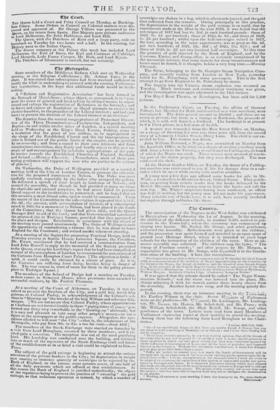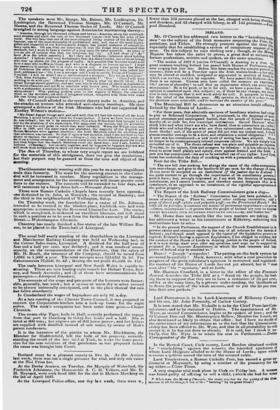nit Couittro.
The emancipation of the Negroes in the West Indies was celebrated in 13iramiegimain on Wednesday time 1st of August. In the morning, the chilthen of the different schools, in number 3,500, wallet(' in pro- cession to time 'town-tall; where the ceremony was commenced by singing two hymns. Mr. Seohel, Mr. Sturge, and other gentlemen, addressed the assembly. Refreshments were given to the children; and the procession was again formed and marched to an open space of ground near liericage Street, where it is intended to erect large schools tOr the instruction of the children of the town. Here an im- mense assembly was collected. The children sang the hymn, " The trump of Freedom sounds ; " 111111 after prayers by Mr. Morgan, a copperplate was given to Mr. Sturge, who deposited it in the founda- tion-stone of the building : it bore this inscription— "The rouo.tilion,i •of hose Sebool.mooms was laid on Wednesday time cal of August 1S35, in commemoration of tit, abolition of Negro Apprenticeship in the Colonies. by the Friend at the Negro, the friend of children, awl the friend of man, Joseph
Esq., in the presence of the United Baptist ?suinla■ Sehools, and assisted by the Bap• tist Ministers in Birmingham Seeretai is to the Building Fund, Middlemure. William !Morgan. Architect, Charles Edge. Conti:tom, Sampson webby."
It was agreed that the schools should be called " The Negro Eman- cipation Schools ;" and the stone was lowered into its place, Mr. Sturge adjusting it with his trowel, amidst three hearty cheers from the assembly. Another hymn was sung, and the meeting quietly dis- persed.
In the evening, there was an immense meeting in th Sir Eardley Wilinot in time chair. Seven 11!,;;•„'oers of Parliament were on the platform—Mr. O'Connell, Dr. Lushington, Mr. Lushing. ton; Mr. :Lines, Mr. Hawes, Mr. Scholetield, and Mr. Pease ; with Mr. William Scholefield, the High Bailiff, Mr. Sturge, and other gentlemen of the town. Letters were reed from many Members of Parliament expressing regret at their inability to attend the meeting. Among then, was the following from Lord Brougham to the Chair- man—.
" London. 30th July 1828.
Sir--1 am exceedingly hippy to and from our worthy friend, J. Star:m.11w you are about to hold a meeting in Birmingham on slavcry ; and l [mast Slave trading a ill not be forgotten. " There is au absolote necessity, in lay very decided opinion, that ull the friends of the cause alio do not 1, 1 disposed to I e sat Islied a ill, a name, should persevere in those exertions by a hiell Our late great victory has been woo—exertions opposed by all the iutlitence of Government at 11111e, and all the force 01 piejodice and supposed interest in the Culotta's. Without this continued a atchfuluess, t much fear Emanci- pation may prove little better than a name, " SulTer net nuttier to remind yon, how much the hands of Government will be strength..ned by an esinc,.sion of the universally existing public opinion upon the it slave-traffic : I mean, strengthened ill tile measures whirl' 1 trust are about to he adopted for old ;titling the exiitietion of that s)Ment of rapine and murder now patro- nized by Purl ugal and Spain. It is shainefoI that other nations a lukh abjured this trade shoold remit two of the most insignili,ont nations in Eulope still to outrage humanity by such Nholesole piracy. Tile people or this colliery eel us our ITO11111p011 the nut jest; and they have but to express what they meet to extirpate the abomination in an instant.
" Wishing all success to your meeting. I have the honour to be, Sir, your obedient
servant, Bil011011•11:.
The speakers were Mr. Sturge, Mr. Baines, Mr. Lushington, Dr. Lushington, the Reverend Thomas Morgan, Mr. O'Connell, Mr. Hawes, and the Reverend Thomas Scales of Leeds. Mr: O'Connell inveighed in strong language against America for maintaining slavery-
" America, through her thousand villiqes and towns—America, ailing her multitudi• anus streams and amid the roar of her thousand waters—will hear the echo of her voice. She will hear that one of the moat eloquent living orators of the British Par. Bement, one of the most successful of professional men, and one of the most highly. gifted and impartial of our Ecclesiastical Jotters, has passed sentence of eternal in- famy upon her. Oh yes, they are infamous—it was the Judge who pronounced that sentence, but I want to have a verdict of a jury upon the same question. As many of you as are of opinion that they are iufamotts, say "ay.' (A load shout e f Ay" burst ,fora the whole assembly.) Ay 1 they are infamous—infamous slave holding America! I believe their very Ambassador lucre is a slave.breeder. one of those beings who rear up slaves for the purpose of tragic Is it possible that America %scold send here a man who truffles iu blood, and alio is a disgrace to human nature ? I hope the assertion is untrue, but it is right to speak out. I was going into the house it Common. the other evening. when a tall, gentlemanly looking man, yellow and lank, addressed me—' Sir, I ant a stranger and 1 wish to see the Ilonse of Commons ? ' I replied,' 1 will do what 1 can to accommodate n at ranger. You are an Alum ican ? ' 'Yes, from Alabama.' And a slice owner. 1 presume?' • Yes.' • Theo I will have nothing to do with you.' (Roars of laughter.) This is what we should till dm d'oi. veraal Europe should proclaim, that any man who is the holder of slaves is degraded in his moral character, and not at to associate with honest men. Who W0111(1 ungoCiale with a pickpocket. a convicted thief, or a murderer ? You would not : and st had is a slave-owner? Why, pickiug pockets rises to the dignity or felony; the convicted thief, or the murderer, are men of mitigated crimes, compared with those who make life on* living and perpetual death."
Mr. O'Connell alluded to the recent slavery mobs in America, and the attacks on women who attended oral-slavery meetings. He then attempted a defence of the Irish Members who had not supported Sir Eardley Wilmot's motion-
-My friend Joseph Stiarge said, and said well, that if I had the rotes of all the Irish Members, I would have given them for Emancipation. I know we have been taunted as: one default but let it be remembered, that alien Wilberforce first brought in his bill for the abolition of the slave trade, Pitt supported the motion, and fur seventeen years it was the only point on which they were defeated. When the Whigs cattle into office in 1906, and the slave.trade woe abolished, the majority of the English and &otitis Members were against abolition: the Irish Members voted for ab,,lition, and that abolitiou was carried. So that if upon a late occasion, (and I am not here to in- dicate or explain the median of my rode:4104,0 they were defaulters, they made op for It ow a former occasion. I have knouu some *tinily Scotch writer. abuse the Irish ; but they forgot that the Scotch Members voted the same way : now I say, Justice to Ireland. (Chearisg) Let us rally together, and let bygones tie bygones, •till see who will work most streauously to carry out the remainder of the Emancipation."
The Sea of Thursday, to whose very ample report we arc indebted for the materials of this abridgment, does riot give the resolutions ; but their purport may be guessed at from the tone and object of the Meeting.



























 Previous page
Previous page